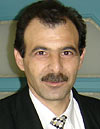An American in Syria. New York Observer journalist Philip Weiss has visited the country demonised by his government, and posted his thoughts. They might make uncomfortable reading for the average American.
Here's what he found...

—I went all over Syria and the people were gracious everywhere I went, hospitable in the way that Arabs are famous for. When I got lost in Damascus, people invariably went out of their way to escort me to the right place, often speaking English. They also wanted to have political conversations at every turn, and to put down Bush and America. Of course, these people have witnessed (I witnessed some of it myself) a lot of suffering from Iraq, the spillover of hundreds of thousands of refugees often with horrifying tales of murder and kidnapping. "The Arab street," which I engaged with whenever I could, was genuinely enraged about American policy. And, yes: they feel completely misunderstood by us.
—The English-language newspaper, The Syria Times, was full of anti-Israel talk. It was the major theme of the paper, to show America and Israel in a corrupt alliance, and sometimes had an anti-Semitic flavor. This tended to support the claim I'd heard from Jewish critics in America, that these dictatorships rely upon stoking anti-Israel feeling to distract their people from their own political problems. I'd add that in a number of conversations with ordinary people I said I was Jewish, and got a neutral response.
—I was surprised by how little evidence I saw of militarism. There were few police in the streets, no soldiers that I can remember, except for a couple of guys with semiautomatic rifles lolling outside an official building. In touring the country, we passed many military bases with watch towers. They were all unmanned. Syria is a poor country, and you see it in the absence of soldiers. I have no doubt that Israel could defeat Syria in no time.
—Partly because of the absence of guys in uniform, I sensed a great deal of personal freedom. The streets are active, lots of people are in business, and only one conversation I had was stopped (when an Arab friend, a woman, held up her hand in a fancy Damascus restaurant as we were talking about the lack of freedom for women in Arab societies, to say that one shouldn't talk about these things in public). People seemed to be leading pleasurable lives, by and large. Commerce was lively. The internet cafes were hard to find, but they were teeming with young men. I am trying to convey my feeling that this is not a totalitarian place. In his book, which describes Syria as fascist, Berman imagines women in Arab societies throwing off their burkas with joy when they are finally liberated. This seems to me obviously wrong: women appeared to me to be covering themselves or not to varying degrees as a cultural norm, in line with their traditionalism and religiosity.
—That said, Arab society is very male. Women are excluded from public life. A New Year's party I went to in a small city was all men, but for a couple belly dancers and tourists. Awful. And it seemed to me that this masculinity is very hierarchical and authoritarian. Very traditional too—like America in the early 20th century. Again and again, I said to myself, I want Islam to experience a reformation, and soon. The upside is I saw no evidence of crime. Indeed, I felt completely safe walking the streets, and never worried about leaving a bag outside my hotel for a few minutes. My companions and I said Syria felt like a Mafia town that way.
—Political complexity. When we were in Tartus, on the coast, we learned that a man from the American Embassy was staying in our hotel, had been there for months, dealing with grain shipments in the port that were destined to go on to Iraq to make bread for the U.S. troops. Does the Syrian government know about this? I asked my informant. Of course. So Syria has aided the occupation of Iraq, in subtle ways. And the State Department is funding education programs in Damascus.
—Finally, per Islam's reformation. Syria has a high literacy rate, but: I never saw anyone reading. They didn't read on the buses I rode. They don't read on public benches. They aren't reading in cafes. Few people seem to wear glasses. Once at a crusader ruin, I saw a schoolboy with a notebook crammed with his writing. A glorious exception, and one that proves the sad point, the intellectual life of the place is not very advanced.
Read the full article here.











